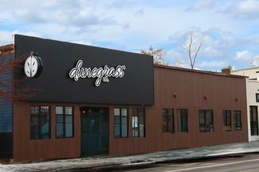
Some Say They’re the Dreamers
In search of solutions to the Up North housing crisis
By Lynda Wheatley | April 30, 2022
If you call Luette Frost and her husband, Todd Grayson, real estate developers, expect a slight cringe from Frost. “I don’t know. I kind of hate that—the connotation,” she says. “Developer feels like such a bad word these days.”
Her reaction is understandable. In a region where home prices and rent are increasingly out of reach for the average person, developers are increasingly seen as big-money operators who are building or buying ever more homes, condos, and vacation rentals exclusively for folks with not-so-average incomes.
Frost and Grayson don’t see themselves—or their family’s business—that way. The rural Traverse City residents run Frost Family Partnership (FFP), through which they and several family members own and manage 28 rental units in and around the area. They define their business as community-focused real estate development and property management and are committed to running it as such.
“Our philosophy is that we really want to add to the affordable housing arena in town while still maintaining a viable business,” she says. That balance drives their portfolio. Rather than renting out each unit at the highest price the market will bear, Frost says that “less than a quarter of our units are just short of what we call our higher-income wage earners, and they help pay for the entire portfolio, which helps us keep rents down on the majority of our properties.”
Case in point? In December, FFP purchased a six-plex of two-bedroom apartments on State Street in downtown Traverse City, behind Bubba’s restaurant. The couple plans to remodel and furnish two of the units and make them available for rent at a premium price so the remaining four can be had for $1,000 a month. “We’ve got two 24-year-olds in one [of the finished units] right now, and they are so excited to be downtown,” Frost says.
Under Development
When FFP purchased the Alpine Apartments building on the corner of Munson Avenue and Airport Access Road in 2020, their goal was—and still is—to transform the ’60s-era property into an attractive multi-use building, one with a majority of apartments set at an affordable rate. Higher-rent commercial spaces on the ground floor and a few high-end residential spaces on the top floor would offset the lower rates for the majority tenants in between.
“What I’m thinking about are the people who, maybe the wife works at a nonprofit, the husband works at a school—they have a dual income of maybe $70,000 or $80,000 a year. They can’t get a housing voucher, they can’t live in low-income apartments with that income. But they can’t afford most of the homes or apartments in Traverse City. Where are those people living?” says Frost.
Unfortunately, the plan for the Alpine Apartments is on hold. As expected, the reassessed property taxes jumped nearly $10,000 annually, says Frost, forcing them to raise rent slightly to cover that cost. Less expected, however, was the pandemic’s effect on their plans: low demand for commercial space and exceptionally high costs for building materials and labor.
Complicating matters: the human component. Frost says that the initial drawing presented to them by a partner developer showed that the most feasible plan would be to raze the existing apartment building and construct a new 96-plex in the center of the property.
“But where are these 25 people [living in the current apartments] going to move to?” says Frost. “We have great people in there. Some people have been in there for a really long time. We can’t do that to people without having an affordable place [our current tenants] can live while a new building is being constructed. … We just had to put it on pause until we can figure something out.”
Meanwhile, Frost is following proposed state legislation that could affect regulations for short-term rentals, which are playing a key role in driving up prices for short- and long-term rentals and homes around the state, especially in resort communities like Traverse City. She says there isn’t a single, simple solution to make the area’s housing problems go away, but she believes some changes could help close the housing gap. One idea: lowering property taxes on buildings that offer a majority of affordable housing. (Admittedly a long shot, she says; property rates are set by the state.) Another idea: placing a small tax on local rentals (as area hotels are taxed to support Traverse City Tourism) and funneling that money directly to a fund for affordable and/or workforce housing.
“Yes, you can make so much more renting out to tourists in the summer and leaving [a rental] empty the rest of the year. It’s a lot less headache and a much higher rate of return. I get it. But it’s a really bad cycle. We’re going to lose talented people because they can’t afford to live here. Really, we’re already losing them. Think of our service industry,” she says. “I think it’s almost like a civic duty—if you’re making money on the tourism industry, let’s put a little back [for the people who live here]. We’re all going to have to understand that part of our business model has to be that we have to help with this situation. It’s a real crisis, and I just think more people need to start caring about it.”
To Hire & House
With affordable rentals increasingly scarce around the North, many employers who’ve been struggling to staff their businesses—especially during their busy summer season—are taking it upon themselves to build or buy housing so their summer staff has a place to live.
Employers like Cherry Republic, Anderson’s Market, and Crystal River Outfitters in Leelanau, and Benzie’s Rick Schmitt, co-owner of Stormcloud Brewing in Frankfort, have all invested in seasonal workforce housing in recent years.
Last month, Short’s Brewing of Bellaire joined the club with the purchase of the 26-unit Bellaire Inn. The worker shortage has been a challenge for Short’s Brewing every summer since they can remember, says brewery CEO Scott Newman-Bale. But this year, with its pub in Bellaire looking to hire up to 20 additional staff, things were at a crisis point.
“We’ve missed out on [non-local] candidates because they can’t find a place to live, and we’ve had employees move out of state because of the lack of affordable, workforce housing. We’re working to get some housing projects shovel ready, but that doesn’t help us out this season.”
The moment word reached Short’s that the Bellaire Inn was on the market, the company moved quickly to buy it and is working feverishly to update the units for their upcoming hires. Short’s plans to offer local businesses first dibs on any units remaining. The company is also planning The Bellaire Marketplace, a three-story development across from the Bellaire Pub, which would have a commerce center on the main floor and two stories of housing above.
Trending

Michigan’s Marijuana Tax at Work
Cannabis has become a big business in northern Michigan, and local governments are putting tax dollars earned from dispensar… Read More >>
California Sober: Why People Are Switching from Alcohol to Weed
They call it “California sober.” Generally speaking, this term applies to folks who use marijuana but abstain f… Read More >>
The Legacy of Student Activism
“It’s a physical letter to your representative,” Alex Tank says when asked to define the word “prote… Read More >>


